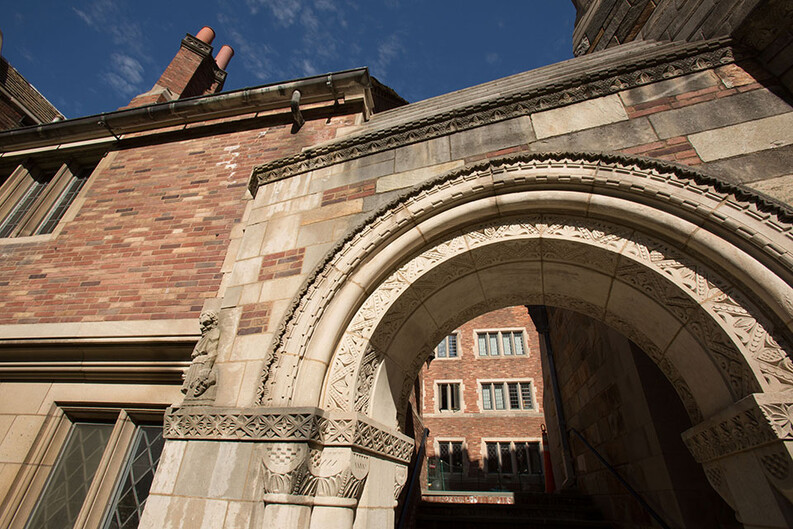CAFE Lab Releases 2021 Proposals

Four student teams in the Climate, Animal, Food, and Environmental Law & Policy (CAFE) Lab4 released their food system reform proposals this week, after several months of work and consultation with experts from across the country.
Sponsored by the Law, Ethics & Animals Program (LEAP)5 at Yale Law School, CAFE Lab seeks to develop novel strategies to compel industrial food producers to pay the currently uncounted, externalized costs of industrial agriculture for people, animals, and the environment. The lab teaches through immersion: graduate students design policy and legal strategies to address complex food system problems, with guidance from seasoned advocates and experts.
In addition to law students, this year’s lab included graduate and professional school students from Yale’s School of the Environment (YSE), School of Management (SOM), and School of Public Health (YSPH). The semester’s work culminated in a pitch meeting, where the students received feedback from food system experts including Emily Broad Leib of Harvard Law School, Tom Conger of Stray Dog Institute, Amanda Hungerford of Open Philanthropy, Peter Lehner of Earthjustice, Urvashi Rangan of the Grace Foundation, and Latha Swamy, the City of New Haven’s Food Systems Policy Director.
The first proposal, “Food is Medicine: Advancing Produce Prescriptions at the State Level6,” was from YSPH’s Elaine Louden ’22 and Evelyn Pan ’21 and SOM’s Corey Baron ’21. The proposal outlines how to use state-specific public health insurance plans to fund produce prescription programs. These chronically-underfunded programs help patients with diet-related illnesses buy fruits and vegetables, and they measurably improve health outcomes, according to the proposal. If state-run insurers were required by law to fund these prescriptions, research suggests that the health improvements would save insurers from paying to treat many chronic conditions, freeing up even more funding for produce prescriptions and proving the value of a “food-as-medicine” approach to public health.
SOM’s Yihui Chen ’22 and Henry Elliman ’22, Yale Law School’s Katherine Kornman ’21, and YSE’s Malika Talwar ’21 propose an executive order to reduce the federal government’s food-related carbon footprint7. Their draft order directs federal government agencies like the Department of Defense to use their purchasing power to promote regenerative agriculture and climate-friendly, plant-based food.
“Federal food purchasing amounts to $1.3 billion every year, spent on meat, poultry, and fish,” Chen explained. “To put this in perspective, McDonald’s, the world’s largest burger chain, also spends $1.3 billion on beef annually.”
The order would also require that the government fund research into food sustainability and would compel the officials responsible for food procurement to include the social cost of carbon in their accounting.
The next proposal, “Building a Better Food System to Advance Justice and Sustainability: Subsidies, Land Grant Universities, and Farmer-Scientist Matching Programs8,” details how states can use subsidies to enact “structural change through research funding.” SOM’s Jenn Burka ’21 and Cristiana Wurzer ’22 and YSE’s Emily Judson ’22 and Humna Sharif ’21 center land-grant university extension programs in their proposal to create “whole farm systems.” These systems balance the triad of sustainability, economic viability, and farmer quality-of-life. By funding this sort of collaborative research between individual farmers and scientists, the team explains, states can promote localized and sustainable agricultural knowledge.
Local knowledge is also central to the last proposal, a game plan for Connecticut’s farm-to-school movement9. How can Connecticut public schools source their food from “a diverse group of regional farmers who use environmentally and socially responsible practices?” the proposal asks. YSE and Vermont Law School’s Ryan Clemens ’22, YSE’s Walker Cammack ’22, and SOM’s Amanda Martinez ’22 lay out a four-step process, building on the existing farm-to-school efforts in Connecticut by growing popular support for farm-to-school efforts, securing legislative funding for the program, enrolling regional farmers, and piloting a cooperative for food sourcing. Throughout their research, the groups highlights lessons from similar programs in other states, as well as how the procurement program could incentivize sustainable and equitable shifts in regional agriculture.
The proposals, along with those from the previous year, are available on the CAFE Lab webpage4.
The Law, Ethics & Animals Program (LEAP) at Yale Law School is a multidisciplinary think-and-do tank dedicated to, first, drawing the attention of leading thinkers and doers to the deep questions of conscience and law that human-animal relationships and industrialized animal cruelty raise, and, second, empowering Yale University scholars and students to produce positive legal and political change for animals, people, and the environment upon which they depend.


